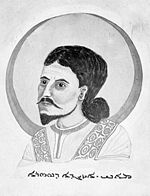
Gospel originally meant the Christian message, but in the 2nd century it came to be used also for the books in which the message was set out; in this sense a gospel can be defined as a loose-knit, episodic narrative of the words and deeds of Jesus of Nazareth, culminating in his trial and death and concluding with various reports of his post-resurrection appearances.

Manichaeism was a major religion founded in the 3rd century AD by the Parthian prophet Mani, in the Sasanian Empire.

Thomas the Apostle, also called Didymus ("twin") was one of the Twelve Apostles of Jesus according to the New Testament. Thomas is commonly known as "Doubting Thomas" because he doubted Jesus' resurrection when first told of it ; later, he confessed his faith on seeing Jesus' crucifixion wounds.
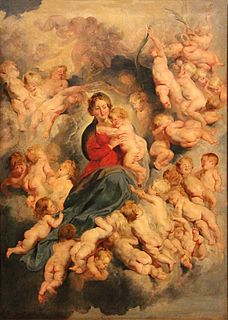
The Massacre of the Innocents is the incident in the nativity narrative of the Gospel of Matthew (2:16–18) in which Herod the Great, king of Judea, orders the execution of all male children two years old and under in the vicinity of Bethlehem. The Catholic Church regards them as the first Christian martyrs, and their feast – Holy Innocents' Day – is celebrated on 28 December. A majority of Herod biographers, and "probably a majority of biblical scholars," hold the event to be myth, legend or folklore.

The Gospel of Thomas is an extra-canonical sayings gospel. It was discovered near Nag Hammadi, Egypt, in December 1945 among a group of books known as the Nag Hammadi library. Scholars speculate that the works were buried in response to a letter from Bishop Athanasius declaring a strict canon of Christian scripture. Scholars have proposed dates of composition as early as AD 60 and as late as AD 250.
Gospel music is a genre of Christian music. The creation, performance, significance, and even the definition of gospel music varies according to culture and social context. Gospel music is composed and performed for many purposes, including aesthetic pleasure, religious or ceremonial purposes, and as an entertainment product for the marketplace. Gospel music usually has dominant vocals with Christian lyrics. Gospel music can be traced to the early 17th century.

The Peshitto is the standard version of the Bible for churches in the Syriac tradition, including the Maronite Church, the Chaldean Catholic Church, the Syriac Catholic Church, the Syriac Orthodox Church, the Malabar Independent Syrian Church, the Syro Malankara Catholic Church, the Malankara Marthoma Syrian Church, the Assyrian Church of the East and the Syro Malabar Catholic Church.

Mani, of Iranian origin, was the prophet and the founder of Manichaeism, a religion of late antiquity strongly influenced by Gnosticism which was once widespread but is no longer prevalent by name. Mani was born in or near Seleucia-Ctesiphon in Babylonia, at the time still part of the Parthian Empire. Seven of his major works were written in Syriac, and the eighth, dedicated to the Sasanian emperor Shapur I, was written in Middle Persian. He died in Gundeshapur.

The Gerousia (γερουσία) was the Spartan council of elders, which was made up of men over the age of sixty. It was created by the Spartan lawgiver Lycurgus in the seventh century BC, in his Great Rhetra. According to Lycurgus' biographer Plutarch, the creation of the Gerousia was the first significant constitutional innovation instituted by Lycurgus. This old Spartan tradition continued in the Deep or Mesa Mani known as the "Gerontikoi" until recent times.

Auṃ maṇi padme hūṃ is the six-syllabled Sanskrit mantra particularly associated with the four-armed Shadakshari form of Avalokiteshvara, the bodhisattva of compassion. It first appeared in the Mahayana Kāraṇḍavyūhasūtra where it is also referred to as the sadaksara and the paramahrdaya, or “innermost heart” of Avalokiteshvara. In this text the mantra is seen as condensed form of all the Buddhist teachings.
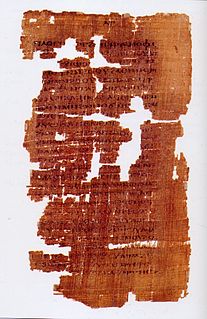
The New Testament apocrypha are a number of writings by early Christians that give accounts of Jesus and his teachings, the nature of God, or the teachings of his apostles and of their lives. Some of these writings have been cited as scripture by early Christians, but since the fifth century a widespread consensus has emerged limiting the New Testament to the 27 books of the modern canon. Roman Catholic, Eastern Orthodox, and Protestant churches generally do not view these New Testament apocrypha as part of the Bible.
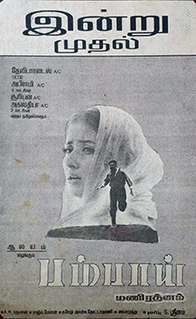
Bombay is a 1995 Indian Tamil-language romantic drama film written and directed by Mani Ratnam, starring Arvind Swami and Manisha Koirala in the lead. The film tells the story of an inter-religious family in Bombay before and during the Bombay riots, which took place between December 1992 and January 1993 after the demolition of the Babri Masjid led to religious tensions between Hindu and Muslim communities. It is the second in Ratnam's trilogy of films that depict human relationships against a background of Indian politics, including Roja (1992) and Dil Se.. (1998). The film was dubbed in Hindi, Telugu and Malayalam with the same title.
Southern gospel music is a genre of Christian music. Its name comes from its origins in the Southeastern United States whose lyrics are written to express either personal or a communal faith regarding biblical teachings and Christian life, as well as to give a Christian alternative to mainstream secular music. Sometimes known as "quartet music" for its traditional "four men and a piano" set up, southern gospel has evolved over the years into a popular form of music across the United States and overseas, especially among baby boomers and those living in the Southern United States. Like other forms of music the creation, performance, significance, and even the definition of southern gospel varies according to culture and social context. It is composed and performed for many purposes, ranging from aesthetic pleasure, religious or ceremonial purposes, or as an entertainment product for the marketplace.

The Living Gospel was a 3rd-century gnostic gospel written by Mani. It was originally written in Syriac and called the Evangelion, from the Greek: εὐαγγέλιον and was one of the seven original scriptures of Manichaeism. A number of fragments are preserved in the Cologne Mani-Codex and on manuscript fragments found in Turfan beginning in 1904. Some Coptic manuscript fragments recovered at Fayyum appear to contain a sort of commentary or homily on the gospel.

Edwin Reuben Hawkins was an American gospel musician, pianist, choir master, composer, and arranger. He was one of the originators of the urban contemporary gospel sound. He was probably best known for his arrangement of "Oh Happy Day" (1968–69), which was included on the "Songs of the Century" list. The Edwin Hawkins Singers made a second foray into the charts exactly one year later, backing folk singer Melanie on "Lay Down ".
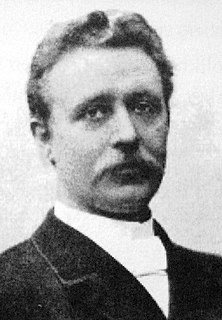
Carl Gustav Boberg was a Swedish poet and elected official, best known for writing the Swedish language poem "O Store Gud" from which the English language hymn "How Great Thou Art" is derived.

Kadal is the soundtrack album, composed by A. R. Rahman for the 2013 Tamil film of the same name, directed by Mani Ratnam that stars Gautham Karthik and Thulasi Nair in the lead roles. Noted poet-lyricist Vairamuthu and his son Madhan Karky penned lyrics for three songs each. Sri Lankan rapper Aaryan Dinesh Kanagaratnam made his debut for Indian cinema with one of the songs. The album was released under Sony Music on 28 November 2012.
The Treasure of Life, also known in the Monijiao tradition as Jìng mìng bǎozàng jīng, is one of the seven treatises of the prophet Mani, written and regarded as part of the major canon of Manichaeism. The title is possibly derived from Christ's parable of the hidden treasure from Matthew 13:44, which is followed by the parable of the pearl in Matthew 13:45–46; incidentally, pearls are a major metaphor used in Mani's teaching.

Seven Sutras of Manichaeism are seven scriptures personally written by the founder of Manichaeism Muni and are the fundamental classics practiced by Manichaeism.
